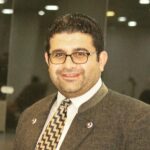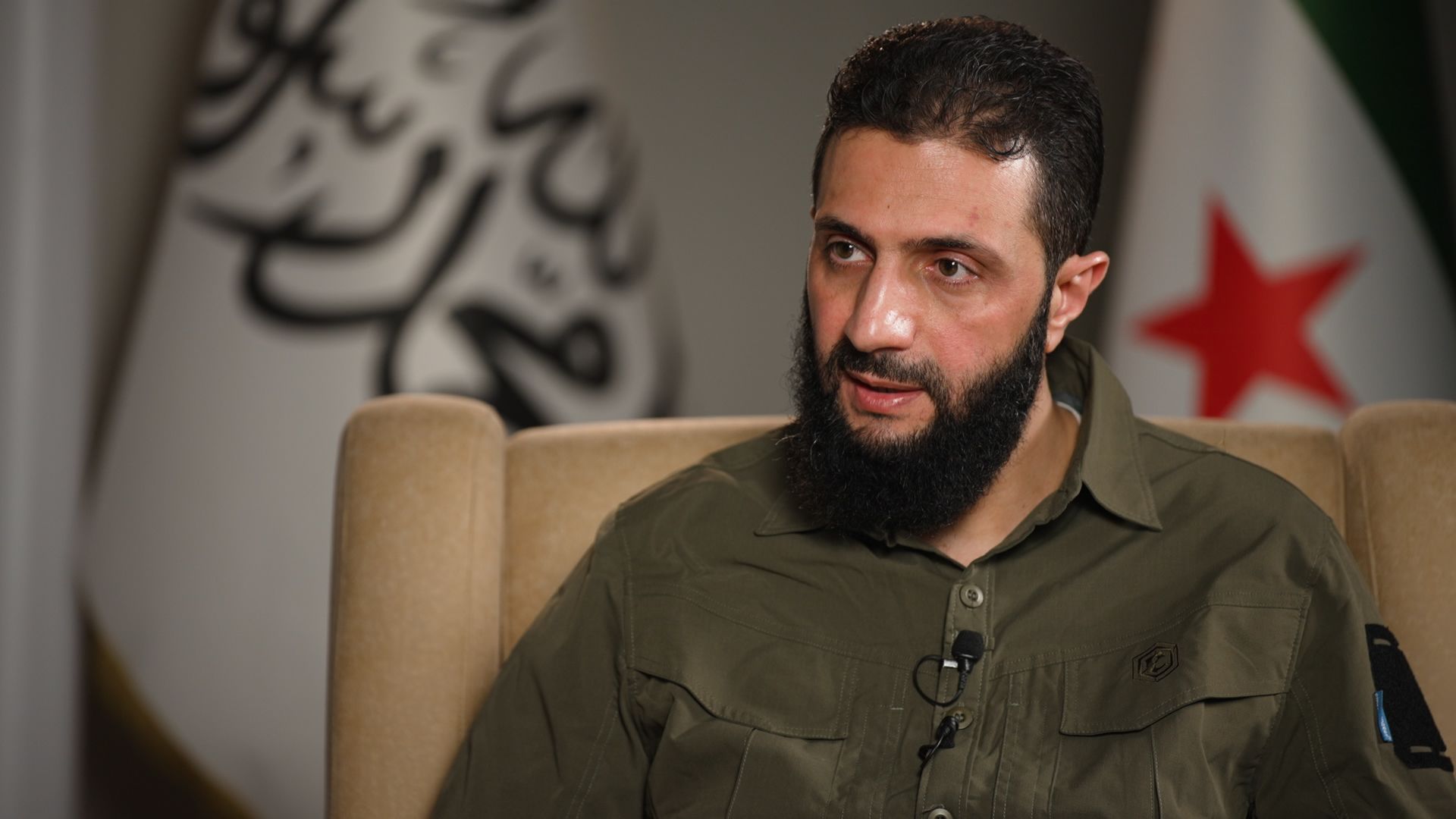Abu Mohammad al-Julani, once a shadowy figure at the heart of Syria’s violent conflict, has gradually shifted his public persona from an extremist militant to a pragmatic leader vying for political legitimacy. As the head of Hayat Tahrir al-Sham (HTS), a powerful opposition group controlling Syria and ending rule of Bashar Al-Assad, al-Julani has become one of the most significant figures in the ongoing Syrian conflict. His journey, from an al-Qaeda affiliate to a leader who claims to represent the future of Syria, is marked by strategic shifts and controversial actions that have made him both a symbol of defiance against Bashar al-Assad’s regime and a highly scrutinized figure internationally.
A Transformative Leader in the Syrian War
Abu Mohammad al-Julani was born Ahmed al-Sharaa in 1982 in Riyadh, Saudi Arabia, where his family moved due to his father’s job as a petroleum engineer. The family returned to Syria in 1989, settling near Damascus. Little is known about his early years in Syria, but it is believed that he became radicalized after the 9/11 attacks and the subsequent U.S.-led invasion of Iraq. During his time in Iraq, al-Julani joined al-Qaeda in Iraq, led by Abu Musab al-Zarqawi, and quickly rose to prominence. He was arrested by U.S. forces in 2006 and spent five years in detention before returning to Syria in 2011.
When the Syrian Civil War erupted, al-Julani saw an opportunity. He established al-Nusra Front in Syria as the country’s al-Qaeda branch, and it quickly became one of the leading opposition forces against the Assad regime. His goal, initially, was to establish an Islamic state, aligning himself with the larger jihadist agenda of al-Qaeda. However, as the war progressed, al-Julani’s path diverged from that of other jihadist groups like ISIS. In 2013, al-Julani rejected Abu Bakr al-Baghdadi’s attempt to merge his group with the Islamic State, maintaining his allegiance to al-Qaeda’s Ayman al-Zawahiri.
The Break with al-Qaeda and the Rise of HTS
In 2016, al-Julani made a significant decision: he broke ties with al-Qaeda and began focusing on Syria-specific goals rather than global jihad. This move was designed to help distance him from the international terrorist designation that had followed his group for years. The same year, he renamed his group Jabhat Fateh al-Sham and presented it as a Syrian-focused opposition force, free from the influence of foreign jihadist organizations. By 2017, al-Julani merged his group with other Islamist factions to form Hayat Tahrir al-Sham (HTS), which came to dominate the opposition forces in the Idlib region.
HTS quickly became a formidable force, not only militarily but also politically. The group began providing essential services in the areas it controlled, including healthcare, education, and infrastructure. In this sense, al-Julani’s transformation into a more pragmatic leader was evident. His goal was no longer to fight for a global caliphate but to control Syria’s northwest, particularly Idlib, and eventually topple Assad’s regime. While HTS maintained its hardline Islamist identity, it began to distance itself from al-Qaeda’s internationalist ambitions, focusing instead on establishing an Islamic state in Syria, free from Assad and his allies.
Al-Julani’s Shift Towards Governance and Protection
Al-Julani’s shift in tactics has not gone unnoticed. He has worked to present HTS as a more moderate force compared to the other jihadist factions that once dominated the opposition. In recent years, he has sought to project an image of a responsible leader, eager to protect religious and ethnic minorities in the areas under HTS control. This is particularly evident in his promises of protection to the Christian minority in Aleppo, a city that his forces captured in a lightning offensive against the Assad regime in late November 2024.
Al-Julani’s transformation was further highlighted when he appeared in a CNN interview, where he reiterated that the goal of his revolution remained the overthrow of the Assad regime but expressed a more tempered rhetoric compared to his earlier extremist pronouncements. He has taken steps to distance himself from groups like ISIS, focusing instead on forming alliances with local opposition factions and even moderating his rhetoric in order to gain support from local populations and international actors.
However, al-Julani’s rule has not been without its controversies. His group has been accused of violent repression against dissent, including the disappearance of activists and the violent quelling of protests in Idlib. The United Nations has accused HTS of war crimes, particularly in the way it has dealt with opposition and criticism within the areas it controls. Despite these accusations, al-Julani has maintained his narrative of being a responsible leader, presenting himself as a partner in the fight against Assad and other foreign influences in Syria, such as Iranian-backed militias.
Al-Julani’s Impact on the Syrian Conflict and Beyond
Al-Julani’s leadership has drastically altered the dynamics of the Syrian conflict. His ability to consolidate power in Idlib and extend his influence across much of Syria’s northwest has made him one of the most powerful and influential figures in the country. As his forces continue to expand, al-Julani appears to be positioning himself not only as a key figure in Syria’s future but also as a potential interlocutor in the international community’s efforts to resolve the conflict.
His group’s rise has presented the international community with a dilemma. While HTS is still listed as a terrorist organization by countries like the United States, the European Union, and Turkey, al-Julani has attempted to separate himself from his past associations with global jihadist groups. He has argued that his group’s focus is now solely on Syria, and that HTS’s primary goal is to topple Assad and expel foreign forces from the country. This shift has led some analysts to view al-Julani’s actions as a pragmatic attempt to gain recognition and support from both local populations and foreign powers, including those in the West.
Al-Julani’s ability to navigate the complexities of the Syrian war has made him a significant figure in the future of the country. As HTS continues to hold significant sway in the northwest, and as al-Julani seeks to position himself as a potential partner in international counterterrorism efforts, the future of Syria remains uncertain. Will al-Julani’s transformation into a more moderate leader be seen as genuine, or is it simply a tactical move to consolidate power and gain legitimacy in a war-torn country? Only time will tell.
Abu Mohammad al-Julani’s journey from an al-Qaeda affiliate to the head of a powerful opposition group in Syria is a testament to his adaptability and strategic thinking. While he remains a controversial figure, his ability to evolve and moderate his rhetoric has allowed him to gain influence both locally and internationally. As HTS continues to consolidate its control over key regions of Syria, al-Julani’s future role in the country’s political landscape will be crucial. His ability to navigate the complexities of Syrian politics, while distancing himself from past extremist associations, positions him as a key figure in the future of the region. Whether or not he can maintain this image of moderation amidst the ongoing conflict remains to be seen, but for now, al-Julani stands as a leader who has reshaped the course of Syria’s civil war.
References:
•“Abu Mohammad al-Julani: Who is Syria’s de facto ruler?” Al Jazeera, December 4, 2024.
•“Abu Mohammad al-Julani: Syria’s Jihadist Leader Turns Moderate,” The Guardian, December 8, 2024.
•“Abu Mohammad al-Julani’s path to power in Syria,” Middle East Eye, December 2024.



